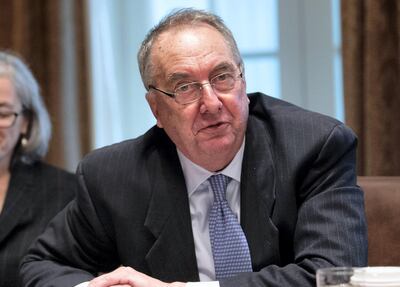A “war capacity” of global vaccine manufacturing will ensure populations are less vulnerable to future pandemics, the head of US vaccine provider Novavax said.
Efforts are under way to launch the Novavax protein-based Covid-19 vaccine candidate that has proven 89 per cent effective against the virus, with a commitment to deliver a billion doses to the global Covax initiative.
Trials conducted in the US, UK and South Africa have proven effective against new coronavirus strains, with focus to be placed on low to middle income nations where vaccines have been scarce up to now.
“We are trying to get the vaccine out as quickly as possible,” said Stanley Erck, president and chief executive of Novavax.
“We started working on pandemic vaccines a decade ago. This is our third coronavirus vaccine after Sars and Mers, all using the same platform, using the same spike protein.
“Once the first efficacy data was out from Pfizer and Moderna that was phenomenal news.
“It gave us the confidence that spike protein was the right way to go.
“It has been a great example of what the industry can do.”
Novavax is a two-dose vaccine stored in a standard refrigerator with high potential to distribute to low to middle income counties from 10 sites across the world, manufacturing 150 million doses a month.
A first approval is likely in the UK where a phase three trial has completed with 96 per cent efficacy against the original Wuhan strain of the virus.
The vaccine has proven to be 86 per cent effective against the UK strain and more than 50 per cent effective on the South African strain of Covid-19.
“The issue for the future to have vaccines on a faster basis will remain a challenge,” said Mr Erck.
“While 100 days could be a challenge, developing a new vaccine in anything under a year is still impressive.
“A global networks of manufacturing capacity is being built up, with 'war capacity' plans that can be turned on overnight.”
In 2019 the World Health Organisation said vaccine hesitancy was one of the biggest threats to global health.
A further challenge to worldwide immunisation is that the majority of vaccines - some 75 per cent - produced so far have been delivered to just 10 nations.
“The only way to stop deaths is to share vaccines around the world,” said Dr Soumya Swaminathan, chief scientist, WHO.
“It has been an unprecedented scientific accomplishment that will set the bar higher for the future with new pathogens.
“This has come from investment over the last decade into new R&D platforms that have allowed us to re-engineer existing vaccines with the new genetic sequences for Covid-19.
“The enormous collaboration between governments, academia and the private sector to facilitate clinical trials has been hugely significant.”














